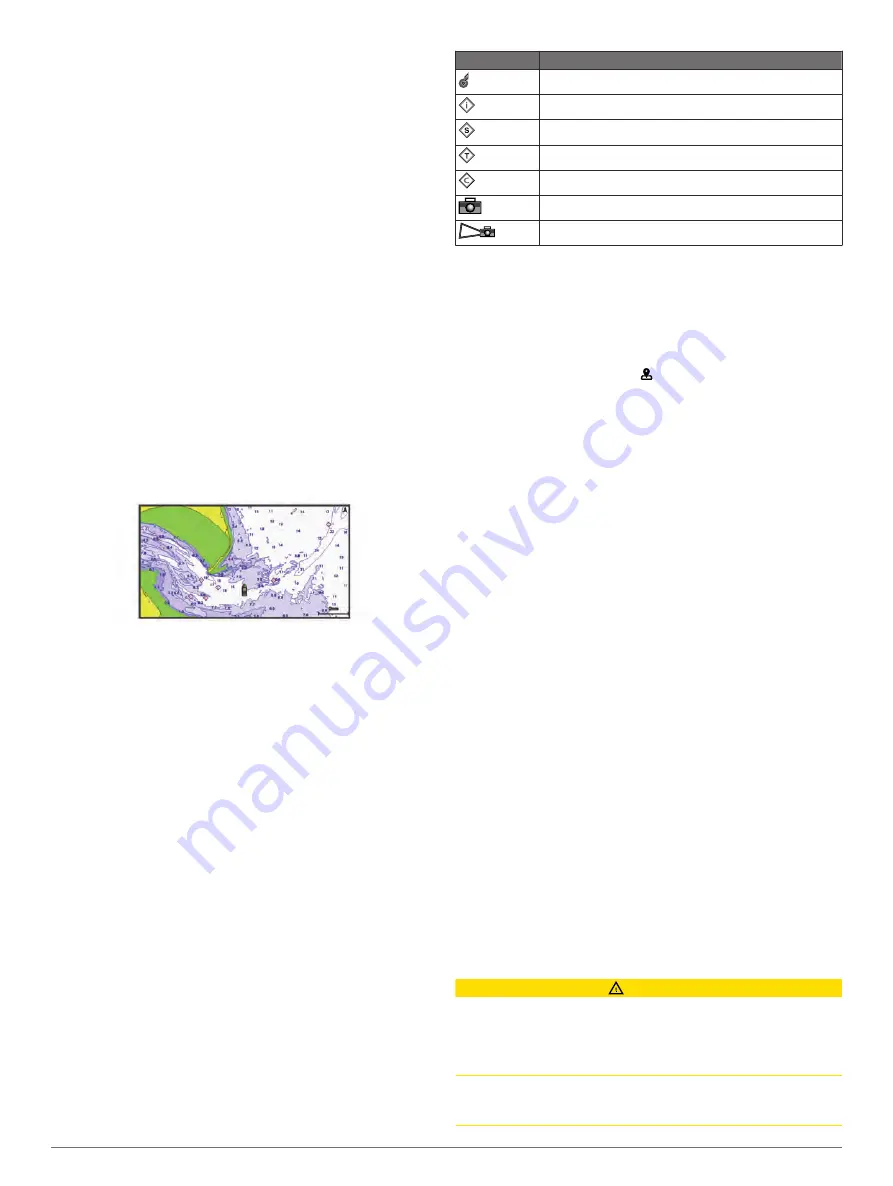
NOTE:
Mariner's Eye 3D and Fish Eye 3D chart views are
available with premium charts, in some areas.
Fish Eye 3D
: Provides an underwater view that visually
represents the sea floor according to the chart information.
When a sonar transducer is connected, suspended targets
(such as fish) are indicated by red, green, and yellow
spheres. Red indicates the largest targets and green
indicates the smallest.
Fishing Chart
: Provides a detailed view of the bottom contours
and depth soundings on the chart. This chart removes
navigational data from the chart, provides detailed
bathymetric data, and enhances bottom contours for depth
recognition. This chart is best for offshore deep-sea fishing.
NOTE:
The offshore Fishing chart is available with premium
charts, in some areas.
Radar Overlay
: Superimposes radar information on the
Navigation chart or the Fishing chart, when the chartplotter is
connected to a radar. This feature is not available with all
models.
Navigation Chart and Offshore Fishing Chart
NOTE:
The offshore Fishing chart is available with premium
charts, in some areas.
The Navigation and Fishing charts allow you to plan your
course, view map information, and follow a route. The Fishing
chart is for offshore fishing.
To open the Navigation chart, select
Charts
>
Nav. Chart
.
To open the Fishing chart, select
Charts
>
Fishing Chart
.
Zooming In and Out Using the Touchscreen
You can quickly zoom in and out of many screens, such as the
charts and sonar views.
• Pinch two fingers together to zoom out.
• Spread two fingers apart to zoom in.
Selecting a Map
If your product has both BlueChart
®
g2 and Garmin LakeVü
™
HD
built-in maps, you can select which map to use. Not all models
have both types of built-in maps.
1
From the Navigation chart, select
Menu
>
Built-In Map
.
2
Select an option:
• When you are on an inland lake, select
LakeVü™ HD
.
• When you are offshore, select
BlueChart® g2
.
Measuring a Distance on the Chart
1
From a chart or the Radar overlay, select a location.
2
Select
Measure Distance
.
A push pin appears on the screen at your present location.
The distance and angle from the pin is listed in the upper-left
corner.
TIP:
To reset the pin and measure from the current location of
the cursor, select Set Reference.
Chart Symbols
This table contains some of the common symbols you might see
on the detailed charts.
Icon
Description
Buoy
Information
Marine services
Tide station
Current station
Overhead photo available
Perspective photo available
Other features common to most charts include depth contour
lines, intertidal zones, spot soundings (as depicted on the
original paper chart), navigational aids and symbols,
obstructions, and cable areas.
Creating a Waypoint on the Chart
1
From a chart or a 3D chart view, select a location or object.
2
Select
Create Waypoint
or .
Viewing Location and Object Information on a Chart
You can view information about a location or an object on the
Navigation chart or the Fishing chart.
NOTE:
The offshore Fishing chart is available with premium
charts, in some areas.
1
From the Navigation chart or Fishing chart, select a location
or object.
A list of options appears along the right side of the chart. The
options that appear vary based on the location or object you
selected.
2
Select an option:
• To navigate to the selected location, select
Navigate To
.
• To mark a waypoint at the cursor location, select
Create
Waypoint
.
• To view the distance and bearing of the object from your
current location, select
Measure Distance
.
The distance and bearing appear on the screen. Select
Select
to measure from a location other than your current
location.
• To view tide, current, celestial, chart notes, or local
services information near the cursor, select
Information
.
Viewing Details about Navaids
From the Navigation chart, Fishing chart, Perspective 3D chart
view, or Mariner’s Eye 3D chart view, you can view details about
various types of navigation aids, including beacons, lights, and
obstructions.
NOTE:
The offshore Fishing chart is available with premium
charts, in some areas.
NOTE:
Mariner's Eye 3D and Fish Eye 3D chart views are
available with premium charts, in some areas.
1
From a chart or 3D chart view, select a navaid.
2
Select the name of the navaid.
Navigating to a Point on the Chart
CAUTION
The Auto Guidance feature is based on electronic chart
information. That data does not ensure obstacle and bottom
clearance. Carefully compare the course to all visual sightings,
and avoid any land, shallow water, or other obstacles that may
be in your path.
When using Go To, a direct course and a corrected course may
pass over land or shallow water. Use visual sightings, and steer
to avoid land, shallow water, and other dangerous objects.
4
Charts and 3D Chart Views

























